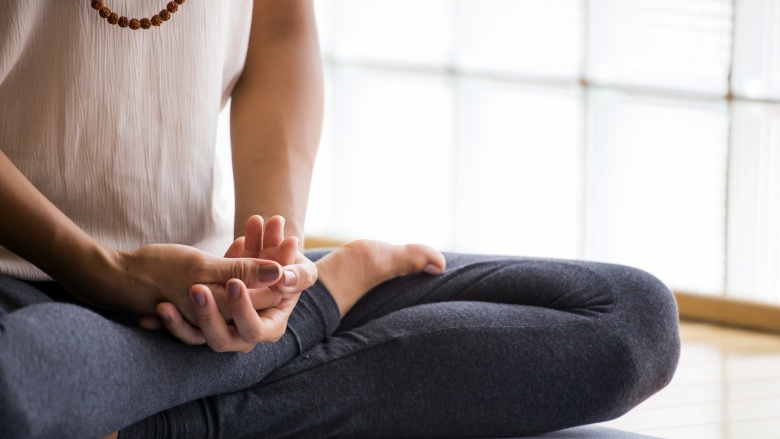What Happens To Your Body When You Meditate
Running late to work, having an argument with your partner, thinking about those unpaid bills. Every day we are hit with stressors big and small that can take us down if we're not careful. These issues start to add up and compound day after day. When stress goes unchecked, it can affect our health and our relationships in a profound way. Unfortunately, these stressful situations are inevitable. There will just be days that don't go well. Your boss will be mad at you, your car will break down, your child will get in trouble at school. So how can we protect ourselves?
The answer is much simpler than we often think: just do nothing! And we mean literally nothing. Put down your phone, close your eyes, and just breathe. Yep, we're talking about meditating.
It's hard to keep up with all the positive benefits of meditation. From improved health to better sleep and job performance, there's not much that can't improve with a little deep breathing. So throw down that meditation pillow and get your "Om" on. It's going to be a good day!
What is meditation?
The Meditation Society of America describes meditation as a "state of consciousness that brings serenity, clarity, and bliss." Sounds pretty good, right? Simply put, meditation is focusing on the present moment. Our minds will always wander, but when meditating, just gently bring your attention back to the present. Feel the sun on your face, hear the breeze through the trees, and be kind to yourself.
Less stress
If you notice yourself feeling chronically stressed or anxious, meditation offers a drug-free, cost-free treatment that is proven to help you feel better.
Researchers at UC Davis found that mindfulness meditation is not only associated with feeling less stressed, but it actually lowers stress hormones in the body. The hormone cortisol is released in the body during times of stress. When you're used to living with a high level of stress, high levels of cortisone in your body go to work and cause health problems like depression, heart disease, headaches, and weight gain.
In their study, UC Davis researchers found that the more participants reported meditating, the lower their cortisol levels.
Better sleep
How many times have you gone to bed exhausted but couldn't shut your brain off? Never-ending to-do lists and worries keep us up for hours, keeping our bodies from getting that restoration they need.
A study in the Journal of the American Medical Association found that mindfulness meditation improved insomnia and sleep problems in healthy adults. The study participants who meditated for 20 minutes per day reported less insomnia, fatigue, and depression than the non-meditation group. Researchers believe that practicing meditation helps us be able to relax our bodies at bedtime, allowing us to fall asleep faster.
Happy feelings
Meditation lowers stress, but it can also protect against depression. Pregnant women who practice daily mindfulness are less likely to report depression during and after pregnancy. When provided in schools, meditation is linked to lower rates of depression in adolescents.
Meditation can actually change the brain itself. Researchers from the University of Oregon have found that meditation can cause physical changes in the brain that may protect against mental illness in the future. Participants who practiced meditation regularly for a month had increased signaling connections in the brain. They also had an increase in the protective tissue around the axons in the brain and improved mood.
Job performance
Staying in the present moment won't just make you feel better, it could actually help you perform better. A study from the Academic Medicine journal found that physicians who practiced meditation were better listeners with their patients. They also reported feeling more self-aware and less judgmental at work.
Soldiers in the Marine Corps have benefited from meditation as well. Those who practice daily mindfulness have improved attentions spans and are more resilient to stress.
These benefits don't just affect employees, but students too. Studies have shown that students who meditate regularly actually score better on tests and have better reading comprehension skills that those who do not meditate.
Deeper relationships
Meditation can actually make you a more compassionate person. In Psychological Science, researchers found that regular meditators felt more compassion toward others and were even more likely to perform good deeds. We all want to be better mothers, wives, and daughters. This sounds like a good way to do it!
Practicing mediation can also help you feel more connected to others. Studies have shown that regular meditation can decrease feelings of loneliness in the elderly.
Healthy body
Meditating can actually make you healthier. It's been shown to help protect against respiratory diseases. Those who meditate may actually miss less work due to illness and have shorter colds and flus than their co-workers who don't meditate.
Meditation can even save you a little money in healthcare costs. A study in the American Journal of Health Promotion found that those who meditate have lower health care bills than those who don't meditate.
And if you've been wanting to drop a few pounds, meditation could even help with that.
How can you practice it?
There are plenty of meditation practices out there, but if you're new to this concept, just start slowly. Try sitting with your eyes closed for one minute. You could start by focusing on your breath to slow your mind. Remember that your mind will wander, and that does not mean you're doing it "wrong."
The most important aspect of meditating is nonjudgment. You simply cannot mess this up. Your meditation practice is just for you, so take a deep breath and enjoy it. There will be times when you try to meditate, and your mind is racing. Just accept where you are and gently bring your mind back to your breath. Just like you need to train for a marathon, the more you meditate, the easier it will be to clear your mind.








